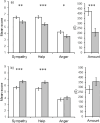Who punishes? Personality traits predict individual variation in punitive sentiment
- PMID: 23531805
- PMCID: PMC10426977
- DOI: 10.1177/147470491301100117
Who punishes? Personality traits predict individual variation in punitive sentiment
Abstract
Cross-culturally, participants in public goods games reward participants and punish defectors to a degree beyond that warranted by rational, profit-maximizing considerations. Costly punishment, where individuals impose costs on defectors at a cost to themselves, is thought to promote the maintenance of cooperation. However, despite substantial variation in the extent to which people punish, little is known about why some individuals, and not others, choose to pay these costs. Here, we test whether personality traits might contribute to variation in helping and punishment behavior. We first replicate a previous study using public goods scenarios to investigate effects of sex, relatedness and likelihood of future interaction on willingness to help a group member or to punish a transgressor. As in the previous study, we find that individuals are more willing to help related than unrelated needy others and that women are more likely to express desire to help than men. Desire to help was higher if the probability of future interaction is high, at least among women. In contrast, among these variables, only participant sex predicted some measures of punitive sentiment. Extending the replication, we found that punitive sentiment, but not willingness to help, was predicted by personality traits. Most notably, participants scoring lower on Agreeableness expressed more anger towards and greater desire to punish a transgressor, and were more willing to engage in costly punishment, at least in our scenario. Our results suggest that some personality traits may contribute to underpinning individual variation in social enforcement of cooperation.
Figures
Similar articles
-
The relationship of the source of punishment and personality traits with investment and punishment in a public goods game.Sci Rep. 2024 Sep 9;14(1):21046. doi: 10.1038/s41598-024-71106-x. Sci Rep. 2024. PMID: 39251690 Free PMC article.
-
Defectors, not norm violators, are punished by third-parties.Biol Lett. 2014 Jul;10(7):20140388. doi: 10.1098/rsbl.2014.0388. Biol Lett. 2014. PMID: 25079496 Free PMC article.
-
Punitive preferences, monetary incentives and tacit coordination in the punishment of defectors promote cooperation in humans.Sci Rep. 2015 May 19;5:10321. doi: 10.1038/srep10321. Sci Rep. 2015. PMID: 25988875 Free PMC article.
-
Dispositional free riders do not free ride on punishment.Nat Commun. 2018 Jun 19;9(1):2390. doi: 10.1038/s41467-018-04775-8. Nat Commun. 2018. PMID: 29921863 Free PMC article.
-
Winners don't punish.Nature. 2008 Mar 20;452(7185):348-51. doi: 10.1038/nature06723. Nature. 2008. PMID: 18354481 Free PMC article.
Cited by
-
An exploration of third parties' preference for compensation over punishment: six experimental demonstrations.Theory Decis. 2018;85(3):333-351. doi: 10.1007/s11238-018-9665-9. Epub 2018 May 14. Theory Decis. 2018. PMID: 30956365 Free PMC article.
References
-
- Alexander R. D. (1987). The biology of moral systems. New York: Aldine de Gruyter.
-
- Axelrod R., and Hamilton W. D. (1981). The evolution of cooperation. Science, 211, 1390–1396. - PubMed
-
- Barclay P. (2006). Reputational benefits for altruistic punishment. Evolution and Human Behavior, 27, 325–344.
-
- Baumeister R. F. (2010). Is there anything good about men? New York: Oxford University Press.
Publication types
MeSH terms
LinkOut - more resources
Full Text Sources
Other Literature Sources
Medical
Research Materials


